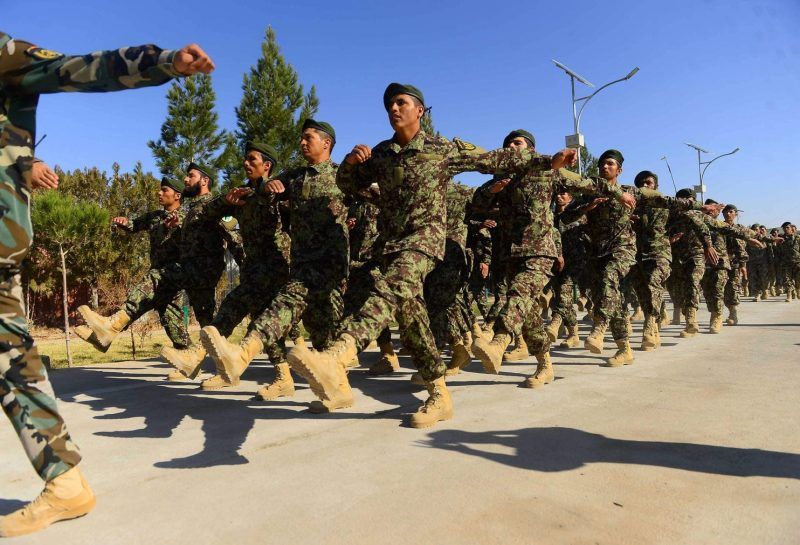
In recent days, President Ashraf Ghani of Afghanistan has met with civic and political actors here to discuss the formation of a team to negotiate peace with the Taliban insurgents who have subjected the country to decades of violence. The U.S. special representative for Afghanistan, Zalmay Khalilzad, said at a Nov. 18 news conference that he is “cautiously optimistic” about peace prospects. He even urged all sides to work toward getting a deal by the spring presidential elections.
As a human rights advocate for many years before I joined the Afghan government in 2016, I used to struggle to imagine how we could ever reconcile with a group that has for so long contravened basic human rights principles. But earlier this year, the need to end this conflict was brought home to me in a profound way.
On April 30, two coordinated suicide bombings in Kabul killed at least 29 people, including nine journalists who had rushed to cover the first explosion. I knew most of those journalists. An hour after the attack, I visited the scene. The smell of burned human flesh and blood, the destruction and depth of the brutality of the crime, struck me like never before. The Islamic State claimed responsibility for that particular attack, but the slaughter was all too much like the mass killings perpetrated by the Taliban since it was ousted from power in 2001 by a U.S.-led military coalition. The shock of my experience last spring has been compounded by the government intelligence reports I’ve seen describing the true impact of the Taliban violence on our people.
Like many Afghans, I now accept that the war has dragged on for too long. The suffering of our people must come to an end. We must make peace.
But even as the sense of urgency for peace grows, the parties involved are still far apart in their objectives. Taliban statements a little more than two weeks ago at a peace conference in Moscow sounded unchanged from statements they made years ago. The Taliban don’t seem ready to acknowledge how fundamentally Afghan society has been transformed since their rule ended, particularly regarding democratic practices and the rights of women. As for the Russians — there is much speculation about the reasons for their involvement in the negotiations, but the platform they provided for the Taliban seemed intended to strengthen the group’s position in future talks.
Afghans’ yearning for peace should not push us to settle for less than our changed country deserves. Peace talks also must not be driven by superficial deadlines urged by a U.S. administration anxious to be done with the conflict. History is instructive: The Nixon administration in the early 1970s, eager to end the Vietnam War, secretly pursued a “ decent interval” strategy that would ensure a buffer of a year or two between a U.S. military withdrawal and the collapse of the South Vietnamese government. Rushing for a settlement with the Taliban instead of doing the arduous work of building peace could be disastrous.
Seventeen years ago, in November 2001, talks were held in Bonn, Germany, to establish an Afghan government after the Taliban’s sudden fall. I participated in the talks and witnessed a hasty process in which the urgency of achieving a short-term objective undermined the participants’ efforts to design a sustainable outcome. We are in danger of repeating that same process, but this time with the Taliban included. A hurried-up approach weakens the positions of the Afghan government and the United States, and encourages the Taliban to resist meaningful negotiations.
The goal for Afghans, and for Washington, should be a process that will protect the transformed Afghanistan, not one that will drive us back into the darkness we were in 18 years ago. This includes holding presidential elections on time in the spring and giving the government in Kabul a fresh mandate and greater authority to negotiate.
The peace talks must take into account the concerns of Afghan women and forward-looking young people. Such concerns are often dismissed as belonging only to urban elites, but that notion is outdated. Unofficial results of last month’s parliamentary elections indicate that we will have the most youthful parliament in our history, with new members coming from a broad range of social, ethnic and political backgrounds.
This is a changed country. Young Afghan men and women, no longer at the mercy of a system dominated by older politicians and warlords, are connected and determined, a peaceful force capable of driving more changes for the better. These groups won’t settle for a political deal that is rushed through without due consideration of Afghanistan’s massive social and political transformations. Peace will take patience, courage and determination. Americans and Afghans have shown that they are more than capable of both.
Nader Nadery, a former senior adviser to Afghan President Ashraf Ghani, is the chairman of the Independent Civil Service Commission and has served as a human rights commissioner.
